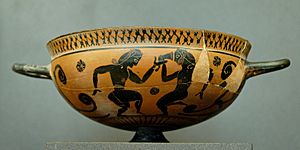Komast cup facts for kids

The Komast cup (also spelled Comast cup) is a special type of drinking cup from ancient Attica, a region in Greece. These cups were among the first of their kind to be made there. They became very popular in places like Ionia and Corinth.
At that time, artists in Attica were often inspired by the beautiful pottery made in Corinth. This influence helped shape the look of the Komast cups.
What is a Komast Cup?
The name "Komast" comes from a word in ancient Greek, komos. A komos was a lively procession or parade that people in ancient Greece would take part in during celebrations. The people in these parades were called "komasts."
Artists who made these cups often drew pictures of these festive parades on them. This type of art was also very popular in Etruscan pottery.
How to Spot a Komast Cup
Komast cups have a unique look. They are shaped like a half-sphere, almost like a bowl. They have a special "offset" lip that angles outwards. The foot of the cup is quite low, usually only about 1 to 2 centimeters tall.
The inside of these cups is usually painted black. However, there is often a narrow band or stripe just below the lip that shows the natural color of the clay. The foot and the outside of the handles are also painted black.
When they were first made, Komast cups were quite large. But over time, the artists started making them smaller.
Who Made Komast Cups?
Many talented artists created Komast cups. The most important of these artists formed a group known as the Comast Group. The most famous painter in this group was called the KX Painter. These artists helped to make Komast cups well-known throughout the ancient world.
See also
 In Spanish: Copa Comasta para niños
In Spanish: Copa Comasta para niños

